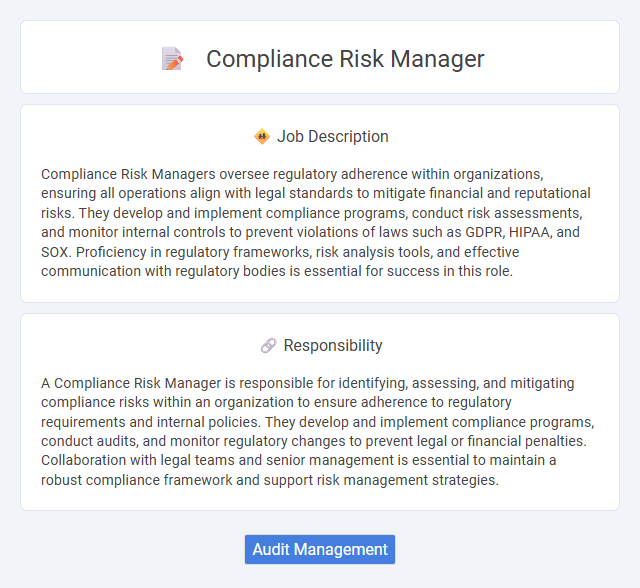
Compliance Risk Managers oversee regulatory adherence within organizations, ensuring all operations align with legal standards to mitigate financial and reputational risks. They develop and implement compliance programs, conduct risk assessments, and monitor internal controls to prevent violations of laws such as GDPR, HIPAA, and SOX. Proficiency in regulatory frameworks, risk analysis tools, and effective communication with regulatory bodies is essential for success in this role.
Individuals with strong analytical skills and attention to detail are likely suitable for a Compliance Risk Manager role, as the job requires identifying and mitigating regulatory risks. People who thrive under pressure and have a solid understanding of legal and industry standards may find themselves well-matched to the responsibilities of monitoring compliance frameworks. Conversely, those who struggle with complex regulations or have difficulty managing stress might find this role challenging and less aligned with their strengths.
Qualification
A Compliance Risk Manager must possess a deep understanding of regulatory frameworks such as GDPR, SOX, and AML, alongside strong analytical skills to assess and mitigate compliance risks. Relevant qualifications often include a degree in finance, law, or business administration, complemented by certifications like Certified Compliance & Ethics Professional (CCEP) or Certified Risk Manager (CRM). Expertise in risk assessment tools, internal controls, and regulatory reporting ensures effective management of compliance obligations across diverse industries.
Responsibility
A Compliance Risk Manager is responsible for identifying, assessing, and mitigating compliance risks within an organization to ensure adherence to regulatory requirements and internal policies. They develop and implement compliance programs, conduct audits, and monitor regulatory changes to prevent legal or financial penalties. Collaboration with legal teams and senior management is essential to maintain a robust compliance framework and support risk management strategies.
Benefit
Compliance Risk Manager roles likely offer significant benefits such as enhanced organizational reputation and reduced legal penalties through effective risk mitigation. Professionals in this position may also experience career growth opportunities due to their specialized skill set in regulatory compliance. They probably contribute to creating a secure business environment, which can lead to increased stakeholder trust and long-term financial stability.
Challenge
The Compliance Risk Manager role likely presents challenges in navigating complex regulatory environments and ensuring organizational adherence to evolving laws and standards. Managing potential risks requires constant vigilance and the ability to interpret ambiguous guidelines to prevent compliance breaches. It probably demands strong analytical skills to identify vulnerabilities and implement effective mitigation strategies under pressure.
Career Advancement
The Compliance Risk Manager role offers significant career advancement opportunities by developing expertise in regulatory frameworks and risk mitigation strategies across industries such as finance, healthcare, and technology. Mastery in compliance risk management tools and regulatory standards like SOX, GDPR, and HIPAA enables professionals to transition into senior risk management or executive compliance officer positions. Continuous professional development through certifications such as CRCM or CRMA further accelerates upward mobility within corporate governance and risk advisory sectors.
Key Terms
Audit Management
Compliance Risk Managers specializing in Audit Management oversee the design and implementation of internal audit processes to ensure regulatory adherence and risk mitigation. They analyze regulatory requirements, identify compliance gaps, and coordinate with audit teams to develop corrective action plans that reduce exposure to compliance violations. Their expertise in risk assessment and monitoring tools enables organizations to maintain robust control frameworks and achieve audit readiness.
 kuljobs.com
kuljobs.com